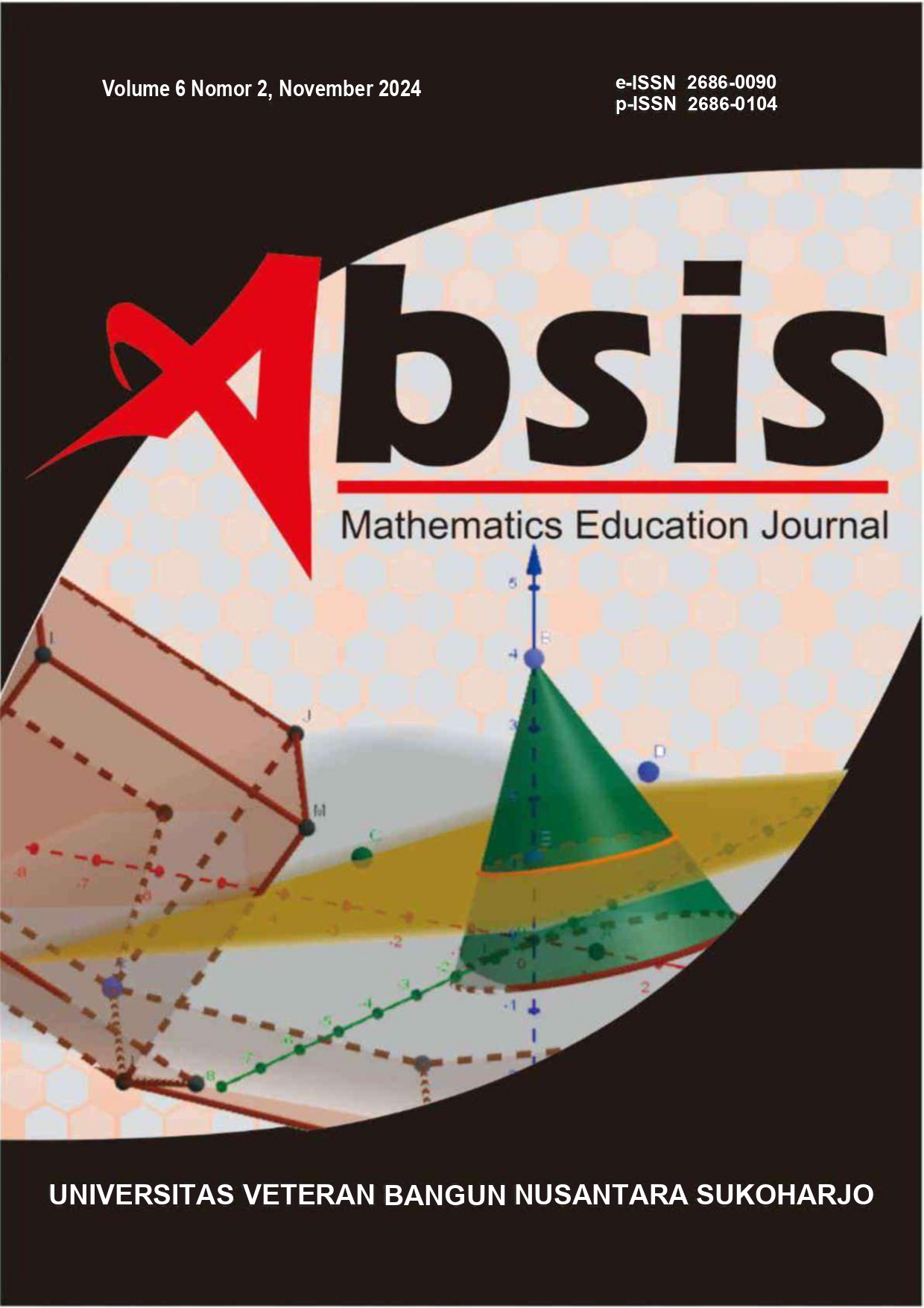Development Of The PISA-Like Mathematics Literacy Test Based On Yogyakarta Socio-Culture
DOI:
https://doi.org/10.32585/absis.v6i2.5478Abstract
This research aims to develop a PISA-Like mathematical literacy test based on Yogyakarta socio-culture that is valid, practical and effective. The research method used is Research and Development (R&D) with the Plomp development model. The subjects of this study were 18 students of class VIII of SMP Teladan Yogyakarta. The instruments used included validation sheets, teacher response questionnaires, student response questionnaires, and test instruments. The results of the study showed: (1) the expert validation results obtained a V-Aiken value of 0.75 with a fairly valid category, (2) There were 7 valid and reliable questions, (3) The teacher's response was very good with a score of 50.67, (4) Student responses to test questions obtained 78% of students obtained a score of 38.1 with a good to excellent category, and (5) 72% of students obtained a mathematical literacy test score with a sufficient to good category. Based on the overall data analysis, it can be concluded that the development of a mathematical literacy test instrument based on PISA-Like with the socio-cultural context of Yogyakarta is declared valid, practical, and effective for measuring the mathematical literacy of class VIII students of SMP Teladan Yogyakarta at the prediction level 3.
Downloads
References
Ary, Donald, L. C. Jacobs, and C. K. Sorensen. 2006. Introduction to Research in Education. Canada: Wadsworth, Cengage Learning.
Charmila, N., Zulkardi, and Darmawijoyo. 2016. “Pengembangan Soal Matematika Model Pisa Menggunakan Konteks Jambi.” Jurnal Pendidikan Dan Evaluasi Pendidikan 20 (2): 198–207.
Gradini, Ega, Firmansyah, and Edy Saputra. 2021. “Pengembangan Tes Literasi Matematis Menggunakan Soal Pisa-Like Konteks Kultur Lokal.” Jurnal Ilmiah Pendidikan Matematika AL-QALASADI 5 (1): 29–43.
Hamzah, A. 2019. Metode Penelitian & Pengembangan Research & Development.
Hidayati, Vivi Rachmatul, Nourma Pramestie Wulandari, Mohammad Archi Maulyda, Muhammad Erfan, and Awal Nur Kholifatur Rosyidah. 2020. “Literasi Matematika Calon Guru Sekolah Dasar Dalam Menyelesaikan Masalah PISA Konten Shape And Space.” JPMI: Jurnal Pembelajaran Matematika Inovatif 3 (3): 185–94.
Idris, K. 2019. “Literasi Statistik Berbasis Konteks Budaya Dan Keislaman: Perspektif Dosen Dan Mahasiswa PTKI.” Prosiding Seminar Nasional IItegrasi Matematika Dan Nilai Islami 3 (1): 357–62.
Imamuddin, M., H. A. Musril, and Isnaniah. 2022. “Pengembangan Soal Literasi Matematika Terintegrasi Islam Untuk Siswa Madrasah.” AKSIOMA: Jurnal Program Studi Pendidikan Matematika 11 (2): 1355–71.
Imania, K.A., and S. K. Bariah. 2019. “Rancangan Pengembangan Instrumen Penilaian Pembelajaran Berbasis Daring.” Jurnal Petik 22 (1): 12–23.
Jufri, Lucky Heriyanti. 2015. “Penerapan Double Loop Problem Solving Untuk Meningkatkan Kemampuan Literasi Matematis Level 3 Pada Siswa Kelas VIII SMPN 27 Bandung.” LEMMA 2 (1): 52–62.
Kaunang, D. F., J. Mantiri, N. O. Mangelep, and U. N. Manado. 2018. “Pengembangan Soal Literasi Matematika Berbasis Kearifan Lokal Minahasa Untuk Siswa SMP.” Frontiers: Jurnal Sains Dan Teknologi 1 (2): 223–30.
Kuswidi, I. 2015. “Brain-Based Learning Untuk Meningkatkan Literasi Matematis Siswa.” Al-Jabar: Jurnal Pendidikan Matematika 6 (2): 195–202.
Laurens, Theresia. 2016. “Analisis Etnomatematika Dan Penerapannya Dalam Meningkatkan Kualitas Pembelajaran.” Jurnal Pendidikan Matematika STKIP PGRI Sumbar 3 (1): 86–96.
Lestariningsih, L., and M. Lutfianto. 2021. “Pengembangan Soal Literasi Matematis Untuk Mendukung Matematisasi Mahasiswa Calon Guru.” Jurnal Elemen 7 (1): 195–208.
etc
Downloads
Published
How to Cite
Issue
Section
License
Copyright (c) 2024 Sellanidia Antika Sari, Rizqona Maharani, Salvador V. Briones II

This work is licensed under a Creative Commons Attribution-ShareAlike 4.0 International License.
Authors who publish with the Absis: Mathematics Education Journal agree to the following terms:
- Authors retain copyright and grant the journal the right of first publication with the work simultaneously licensed under a Creative Commons Attribution License (CC BY-SA 4.0) that allows others to share the work with an acknowledgment of the work's authorship and initial publication in this journal.
- Authors are able to enter into separate, additional contractual arrangements for the non-exclusive distribution of the journal's published version of the work (e.g., post it to an institutional repository or publish it in a book), with an acknowledgment of its initial publication in this journal.
- Authors are permitted and encouraged to post their work online (e.g., in institutional repositories or on their website) prior to and during the submission process, as it can lead to productive exchanges, as well as earlier and greater citation of published work.







